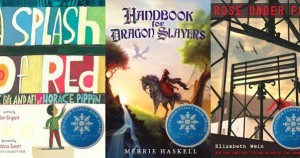
Interview with Rachel M. Wilson about Don’t Touch
Don’t Touch is an insightful look into the life of a girl with OCD, and we were delighted to interview author Rachel M. Wilson about this wonderful debut.

Don’t Touch is an insightful look into the life of a girl with OCD, and we were delighted to interview author Rachel M. Wilson about this wonderful debut.

You Look Different in Real Life is a contemporary YA novel in which the broken friendship between the protagonist and her autistic best friend plays a central role–a thoughtfully handled plot thread that we were eager to talk to author Jennifer Castle about.

Shaunta Grimes’s Viral Nation is the rare YA dystopian novel with an autistic protagonist; we were keen to sit down with the author to discuss the book, its sequel Rebel Nation, and its protagonist Clover Donovan.

A one-armed astronaut superhero is the lead in Dangerous, the unusual new novel by NYT bestselling and Newbery Honor-winning author Shannon Hale, who sat down with us for a great interview.
If our contributors could tell an author writing a character with their disability one thing–besides “do your research”–what would it be?

Pete’s autism is portrayed over and over again as being non-stop pain and suffering. That got incredibly hard to read; do people really think this is what autism is like?
Is any representation better than no representation? That argument frequently comes up in response to criticism, but is it valid?

We’ve been wanting to shake hands with the good folks of the Schneider Family Book Award–an ALA award which highlights depictions of disability in children’s literature–for a while, and July 2014 marked the perfect time: while we celebrated our first anniversary, the Schneider celebrated its tenth!

April Henry’s main character in Girl, Stolen is a well-researched, well-written example of blindness, and we were thrilled to discuss the book with her.

An exceptionalist narrative might, at first glance, seem like a positive or even empowering one. But, as it always goes when it comes to depictions of disability, the situation is much more complicated than that-